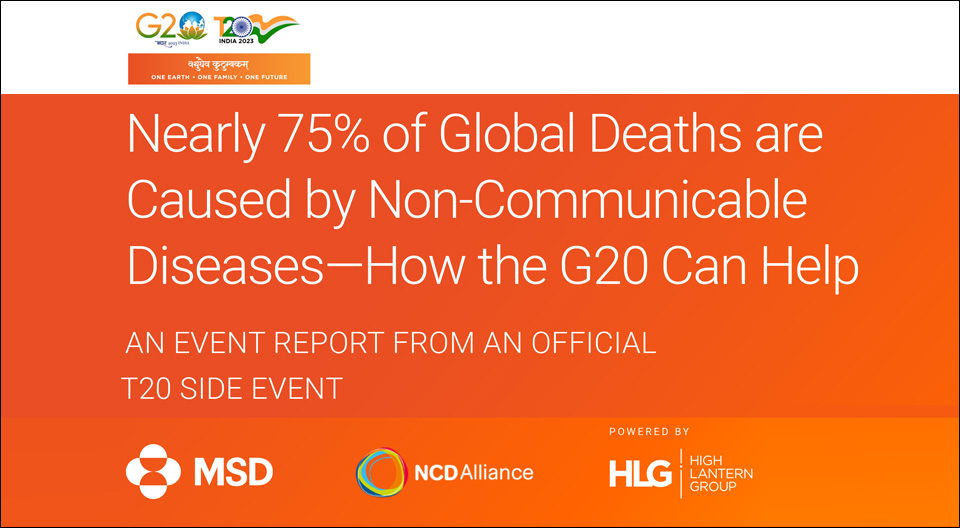Non-Communicable Diseases (NCDs) are a leading cause of death in most G20 countries, with the top five NCDs alone inflicting nearly US$2 trillion in economic losses every year. NCDs are projected to be responsible for 3 in every 4 deaths by 2030, and the ongoing crises of population ageing and climate change could further compound the challenges G20 governments are poised
to face in the years ahead. Moreover, with over three quarters of NCD deaths occurring in low- and middle-income countries (LMICs), the burden of NCDs is not shared equally. NCDs undermine the quality of life and overall longevity for patients, while also causing significant collateral harm to caregivers. It is crucial that governments take action on this issue.
For these reasons, the United Nations (UN) has been promoting the achievement of Sustainable Development Goal (SDG) 3.4, which calls for the reduction of premature mortality from NCDs by one-third by 2030 from 2015 levels. While some governments have begun to make progress in recent years, the World Health Organization (WHO) estimates that the annual rate of reduction so far is just under 1% per year.

To help countries make greater progress on SDG targets, in 2013, the World Health Assembly (WHA) released their NCD Global Action Plan, which outlined 16 specific policy interventions for significantly lowering the global NCD burden. Building on these recommendations, the NCD Countdown 2030 report, released in 2018, identified 21 cost-effective interventions that, if implemented across LMICs, could help prevent an estimated 39 million deaths and yield economic returns of US$2.7 trillion from 2023 to 2030. Among other solutions, the report encourages Governments to consider health taxes on cigarettes and alcohol, raise awareness around NCDs, and help their populations understand the responsibility that they have for their own health.
As NCDs have a disproportionate impact on the most vulnerable communities, continued global leadership and greater action on NCDs will be essential to ensuring that all countries appropriately prioritize and invest in NCD prevention and care in the coming decades. To help sustain ongoing dialogue on the need for sustainable financing for NCDs, on July 12th, 2023, the NCD Alliance and MSD jointly hosted an official T20 side event moderated by High Lantern Group, “Nearly 75% of Global Deaths are Caused by Non-Communicable Diseases—How the G20 Can Help.”
Centered on the role of the G20 in addressing NCDs, this closed roundtable discussion featured insights and perspectives from leading experts in the field of NCDs, including G20 affiliate and working group members, patient representatives, policymakers, health officials, and NGO and private sector leaders. During the event, experts discussed the current state of NCD policies in G20 countries, the need for prioritizing investment, and how the G20’s role as the preeminent global body for economic and financial cooperation can help to identify and promote sustainable and diversified sources of funding and financing.





